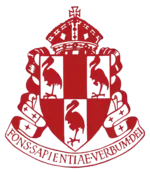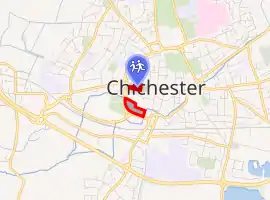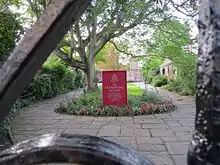The Prebendal School
The Prebendal School is an independent preparatory school in Chichester, situated adjacent to the Chichester Cathedral precinct. It is a boarding and day school with roughly 150 pupils including the cathedral choristers. The school has ancient origins as the medieval cathedral song school at the thirteenth-century school house in West Street.[2]
| The Prebendal School | |
|---|---|
 | |
| Location | |

| |
England | |
| Information | |
| Type | Preparatory Independent |
| Motto | Latin: Fons Sapientiae Verbum Dei The Word of God is the Fountain of Wisdom |
| Religious affiliation(s) | Church of England |
| Established | 1121 |
| Founder | Refounded in 1497 by Bishop Edward Story |
| Chair of Governors | Dean Stephen Waine |
| Head | Louise Salmond Smith |
| Gender | Mixed |
| Age | 3 to 13 |
| Enrolment | ≈180[1] |
| Houses | 4 |
| Colour(s) | Red |
| Publication | The Prebendalian |
| Former pupils | Old Prebendalians |
| Website | http://prebendalschool.org.uk/ |
In 2020, The Telegraph named The Prebendal School as one of the best value independent schools in the country.[3]
History
The Prebendal is the oldest school in Sussex and probably dates back to the foundation of Chichester Cathedral in the eleventh century when it was a 'song school', teaching and housing the choristers. It was later extended to admitting other boys from the city and neighbouring areas.[4] In 1497, it was re-founded as a grammar school by the Bishop of Chichester, Edward Story, who also attached it to the Prebend of Highleigh in Chichester Cathedral, hence the name of the school.[5]
The thirteenth-century school house with its narrow tower still stands in West Street. Long dormitory, on the top floor, contains 300-year-old panelling, featuring some historic graffiti. Two adjoining eighteenth-century houses have been added, while the addition in 1966 of the east wing of the Bishop's Palace, which is next door to the main school buildings, provides considerable extra space. Further renovations have provided an assembly hall, new classrooms and an art room. There is a modern science laboratory and an ICT room.[6] In 2012, the school expanded into adjoining period properties on West Street.[7]
Girls were introduced into the school in 1972. The school is now a co-educational, day and boarding preparatory school for children between 3 and 13 years of age.
Structure
The school consists of the Pre-Prep (Nursery to Year 2) and the Prep (Years 3-8). Each pupil is a member of a school house, which are named after former Bishops of Chichester. There is also a boarding house that accommodate up to 46 boarders. The school remains open for Choristers in the weeks prior to Christmas, Easter and the Southern Cathedrals Festival. The Nursery, Pelicans, is open throughout the normal school holidays.
Academia

Pupils are taught the Common Entrance or Common Academic Scholarship examination to senior independent schools, offered by the Independent Schools Examinations Board. School examinations take place once a year during the summer term. However, the teaching is underpinned by the Pre-Senior Baccalaureate (PSB) core skills of Thinking and Learning, Reviewing and Improving, Communicating, Collaboration and Leadership. The PSB is designed to encourage strong partnerships between parents and schools that promote an understanding of how each individual child learns.
In 2018, 1:1 iPads were introduced for older pupils and technology was embedded throughout the daily curriculum enabling pupils to develop skills that would enable them to incorporate purposeful technology into school life in preparation for senior school.[8] This facilitated a smooth transfer to remote learning in 2020 when schools had to close due to the COVID-19 pandemic.
In 2019, 71% of Year 8 leavers were awarded a scholarship to their senior school. In 2020, this had risen to 82%. Scholarships gained in recent years have included schools such as Eton, Harrow, Charterhouse, Lancing, Portsmouth Grammar School and Benenden.[9]
Music
As a choir school educating the cathedral choristers, the school has an extremely strong music department.[6][10] Concerts take place throughout the academic year. many concerts are informal, but a number are performed in Chichester Cathedral. Music competitions are also arranged in school: the inter-house music and house singing competitions being notable examples.[7] Since 2006, the school has applied a policy of "Music for All", in which each pupil receives a musical instrument education during their time, with a wide variety of instruments on offer. There are many groups, including two choirs, a full orchestra, concert band, ensembles of string, woodwind, brass, and percussion instruments, a Baroque trio and many other chamber groups.
Sport
The school enjoys eight acres of playing fields that run alongside the historic city walls. Good use is made of other local facilities, including those of the adjacent Chichester College and Westgate Leisure Centre.
Outdoor Education
The Prebendal School is a Beach School, offering fortnightly outdoor learning sessions at West Wittering and Bracklesham Bay for the Pre-Prep. The school has a well-equipped outdoor classroom on site that is used across the curriculum. Forest School sessions take place either on the school campus or in the Bishop's Palace Gardens.
Heads
The current Head, appointed in 2017, is Louise Salmond Smith, previously Head of Junior School at Tormead School. Having been an Academic and Music scholar at Clayesmore School, she went on to gain degrees at Durham University, University of East Anglia, University of Hull, Keele University and University of Gloucestershire. She is a Fellow of the Royal Society of Arts and an Inspector for the Independent Schools Inspectorate.[11]
The following list includes Heads of the school prior to its re-founding in 1497:[12]
- 1121 John
- 1145 Peter
- 1148 Joseph
- 1180 John d'Aquila
- 1192 Galfridus Aquillon
- 1214 Hugh de Tournay
- 1222 Ralph de Neville
- 1227 Eustace de Leveland
- 1229 Thomas de Lichfield
- 12?? John Clymping
- 1248 John de Arundel
- 1256 William de Bracklesham
- 1280 William de Pagham
- 1288 John de Lacy
- 1330 Henry de Garland
- 1332 John Bishopstone
- 1362 Walter Bracklesham
- 1362 Henry Cookham
- 1367 Robert de Walton
- 1371 John de Kepston
- 13?? Thomas Romsey
- 1386 John Shillingford
- 1388 Lambert Threkingham
- 13?? Simon Russell
- 1396 Walter Meetford
- 1396 John Yernemouthe
- 1399 William Reed
- 1407 Robert Neel
- 1430 John Stopydon
- 143? John Morton
- 1439 John Faukes
- 14?? Thomas Gyldesburgh
- 1478 Edmund Lichfield
- 1483 John Brackenburgh
- 1496 Thomas Burwell
- 1497 John Wykley
- 1500 John Holt
- 1502 William Hone
- 1504 Nicholas Bradbridge
- 1521 John Goldyff
- 1523 William Freynd
- 1531 John Tychenor
- 1538 Anthony Clarke
- 1550 Thomas Garbard
- 1554 Augustine Curteys
- 1556 Robert Oking
- 1561 Matthew Myeres
- 1570 Henry Blackstone
- 1571 John Penven
- 1572 John Beeching
- 1578 George Buck
- 1582 John Sandford
- 1582 Edward Bragg
- 1591 William Sale
- 1594 Hugh Barker
- 1604 George Elgar
- 1642 George Collins
- 1660 Thomas Barter
- 1665 John Baguley
- 1669 Francis Bacon
- 1685 Robert Tupp
- 1701 Thomas Baker
- 1730 William Wade
- 1768 Richard Tireman
- 1776 John Atkinson
- 1784 David David
- 1797 John Stevens
- 1802 Moses Dodd
- 1808 George Bliss
- 1824 Charles Webber
- 1840 Thomas Brown
- 1879 Frederick G. Bennett
- 1912 William F. Pearce
- 1931 Arthur S. Duncan-Jones
- 1935 Philip C. Manwaring
- 1945 Philip E. Ellard-Handley
- 1951 Charles H. Sinclair
- 1953 Guy F. Hepburn
- 1969 Neville F. Ollerenshaw
- 1982 Godfrey C. Hall
- 2005 Timothy R. Cannell
- 2017 Louise Salmond Smith
Old Prebendalians
Alumni are known as Old Prebendalians. Notable Old Prebendalians include,
- William Juxon (1582–1663), Archbishop of Canterbury (1660–1663)
- John Selden (1584–1654), jurist, philosopher and parliamentarian
- William Cawley (1602–1667), politician and regicide of Charles I
- William Collins (1721–1759), poet
- James Hurdis (1763–1801), clergyman and Professor of Poetry at Oxford University (1793–1801)
- Charles Gordon-Lennox, 5th Duke of Richmond (1791–1860), MP for Chichester (1812–1819) and Postmaster General (1830–1834)
- Horatio Nelson, 3rd Earl Nelson (1823–1913), politician
- Edward B. Titchener (1867–1927), psychologist who developed the theory of structuralism
- MacDonald Gill (1884–1947), graphic designer, cartographer, artist and architect
- Christina Bassadone (1981–), sailor who competed in the 2008 Summer Olympics
- Isaac Waddington (1999–), singer, pianist and finalist on the ninth series of Britain's Got Talent
References
- "Independent Schools Council profile". ISC. Retrieved 12 September 2017.
- Ollerenshaw, Neville (28 September 1984). A History of the Prebendal School. Phillimore. ISBN 9780850335521.
- https://www.telegraph.co.uk/money/consumer-affairs/best-value-private-junior-schools-still-accepting-applications/
- "History of Chichester cathedral choir school". Of Choristers - ancient and modern. Archived from the original on 10 February 2015. Retrieved 13 June 2015.
- Miner, John Nelson (1990). The Grammar Schools of Medieval England. McGill-Queen's Press. pp. 277–278. ISBN 0-7735-0634-9.
- "ISI Integrated Inspection: The Prebendal School" (PDF). March 2015.
- "The Good Schools Guide review for The Prebendal School". Retrieved 13 June 2015.
- https://www.prebendalschool.org.uk/237/introduction
- https://www.prebendalschool.org.uk/255/year-8-leavers-awards
- "Prebendal School in Chichester celebrates outstanding rating". Chichester Observer. 8 May 2015.
- https://www.prebendalschool.org.uk/263/staff-governors
- Bromfeld, Tom (September 2016). "The Prebendal School's Quest for Remembrance" (PDF). Chichester in the Great War.